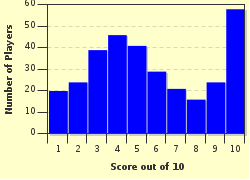Quiz Answer Key and Fun Facts
1. Same-sex relationships were common in Ancient Greece. What elite military unit was formed of couples, chosen to fight side-by-side in combat, during the fourth century BCE?
2. How many men were in the elite homosexual group of soldiers formed by Gorgidas in 378 BCE?
3. Which general was responsible for the decision, in the 4th century BCE, to establish a single gay fighting unit, rather than having gay couples spread throughout the army to act as an inspiration along the battle front?
4. In 375 BCE, a battle was waged in which an elite gay army unit decisively defeated a force estimated to outnumber them by a factor of more than 3 to 1. Where did this battle take place?
5. Against which city-state was the battle of Leuctra fought, in which an elite gay army unit was considered to have played a decisive role?
6. An elite gay army unit is known to have functioned as a special unit from 378 to 338 BCE. Why did the group cease to exist in 338?
7. The city of Thebes erected a monument at the mass grave of an elite gay army unit as a mark of appreciation for the warriors. What form did the monument take?
8. In 1967, male homosexuality was partially decriminalized in Great Britain. Did this decriminalization include members of the military?
9. Between 1916 and 1947, a US soldier discovered to be homosexual would be given a discharge that was neither honorable nor dishonorable. What was the colourful nickname for this type of discharge?
10. In the 20th century, which of the following NATO countries allowed openly-professed homosexuals to enlist in their armed forces?
Source: Author
looney_tunes
This quiz was reviewed by FunTrivia editor
bloomsby before going online.
Any errors found in FunTrivia content are routinely corrected through our feedback system.


